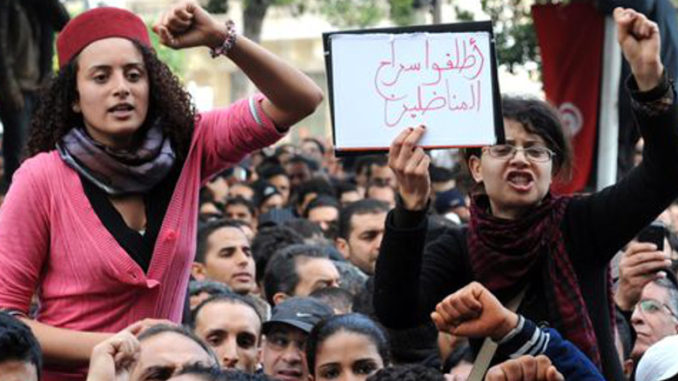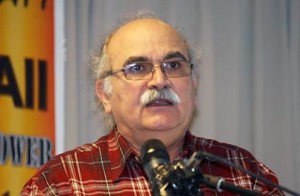

[This interview was carried out in January 2011 by Toward Socialism, the political newspaper of the Left Worker-communist Party of Iraq (LWPI), published in Arabic.]
Toward Socialism: The events in Tunisia started with a man burning himself to protest against his unemployment, humiliation and his inability to make a living. How do you describe the unfolding huge demonstration that led to the escape of Ben Ali?
Hamid Taqvaee: The man who protested by setting himself on fire was representing the majority of Tunisian people. The majority of people are facing unemployment, poverty, low wages and high prices, and the current uprising shows that people cannot stand the status quo anymore. On the other hand, the people of Tunisia have been oppressed by a brutal and corrupt regime for 23 years. When a couple of weeks ago people found out about the multi billion wealth of the Ben Ali family on WikiLeaks, it was the last straw. The majority of Tunisians, like people of Iran, or any other country under a brutal dictatorship, have been hating their government and the existing regime for a long time, but a revolution erupts under certain political conditions. In the case of Tunisia, unbearable poverty, in contrast to the unimaginable wealth of the dictator and his gang, provided those conditions. The revolution already succeeded in overthrowing Ben Ali, but it is only the beginning. The dictator has escaped but the dictatorship is still present. The revolution should, and it seems that it does, go forward to overthrow the whole regime.
Toward Socialism: The revolution in Iran that occurred about one and a half years ago and still expresses itself on different occasions, has a similar nature: an eruption of a revolt of millions of people, young, women, intellectuals, workers, unemployed … and so on, after the results of the “elections” were announced. Do you see a similarity between the events in Iran and the current one in Tunisia?
Hamid Taqvaee: The people of Iran have been confronting a brutal dictatorship for more than three decades. In Iran like Tunisia people are facing poverty, unemployment, corruption of the government and all the authorities, lack of political freedom and civil liberties, persecution, arrest, torture and execution of opposition parties’ members, political activists, and even individuals who do not totally agree with the Supreme Leader, etc. The uprising of 2009 was a mass protest against these conditions. I think the present revolution in Tunisia, as far as the immediate goals and demands of people are concerned, is very similar to the 2009 uprising in Iran. In both countries people are protesting against a corrupt and brutal regime and fighting for freedom, equality, prosperity and a decent life.
I think the present events in Tunisia will have a crucial impact on the political situation in Iran. You already can see slogans like “after Ben Ali, is Seid Ali’s turn” on many Iranian internet sites and groups – referring to Seid Ali Khamenei, the supreme leader of Islamic Republic in Iran.
Toward Socialism: Now Ben Ali has escaped but the regime is still there. What do you say to the people of Tunisia? Is it over? If not, then how do they proceed?
Hamid Taqvaee: Of course it is not over and people on the streets know that. That’s the reason nobody accepted the interim government, and Ghanochi, who himself is a leftover of Ben Ali’s gang, is facing the resignation of his ministers every other day. As I already mentioned, the dictatorship, the regime, is still in place. The ruling class and reactionary forces, including Western powers and all governments in the Arab world, are trying to abort the revolution and are trying to save and keep in place as many parts of the state apparatus as they can. It is a classic case of reaction of anti-revolutionary forces. The revolution can and should go on until the whole system is overthrown.
Toward Socialism: What in your opinion are the basic demands of the people to any government that might replace the old one? Why are particular demands important for the people to defend at this juncture?
Hamid Taqvaee: The very first and urgent goal of any revolution is to get rid of the old state and political system. All the authorities and individuals who took part in Ben Ali’s dictatorship should be prosecuted and put on trial. They are criminals and have no legitimacy to be a part of a new government or take part in elections and so on. The revolution is against them and only by arresting these criminals and putting them on trial, can it go forward. Also, all the reactionary laws and institutions should be abolished. All the political prisoners should be released. Other urgent demands of people are civil and political freedom, freedom of speech, press, assembly, strike and demonstration, abolition of capital punishment, abolition of discriminatory laws, especially against women. As I mentioned before one of the main causes of the revolution is poverty and unemployment. So providing decent jobs and unemployment insurance for everybody who is ready to work is the immediate task of any government that wants the support of people. These are the minimum and basic demands of people and should be accepted by any government and also any political party in the opposition. These are the criteria people should use to differentiate between revolutionary and reactionary forces in today’s political situation in Tunisia.
Toward Socialism: Do you expect Islamists to come to power as an alternative? What are your ideas in this regard? What do you say to people who see the Islamists mobilizing in this vacuum and call for mass prayers in the streets of Tunisia? Is it enough to be an opposition party or oppressed party by the old regime to be elected as “democratic”? Why?
Hamid Taqvaee: I don’t think Islamists have much chance to come to power by their own merits. Tunisia is not Lebanon or Gaza and Islamists don’t have much social influence there. Tunisia is a secular and modern society and people and their revolution up to now showed no intention to move toward Islamism. I think the only way for Islamic groups to emerge as an alternative for political power in Tunisia is by getting the support of Western states and it is not very likely unless of course Western powers find no other alternative. Nevertheless, considering the general status of Political Islam in the region and presence of a banned Islamic opposition party in Tunisia one should take the threat of Islamism very seriously.
In answer to the second part of your question I should point out that if a party is in opposition to a dictatorship, that does not necessarily make it a democratic and progressive party. Khomeini in Iran was opposing the Shah’s regime and was a very reactionary figure. If Iranian people found out the true nature of political Islam in a hard way, Tunisians do not have to. The experience of the Islamic Republic in Iran, Taliban in Afghanistan and Islamist groups in Iraq shows that Political Islam everywhere and in position or opposition is a reactionary force and a major barrier in front of people, especially women, to achieve freedom and equality. People of Tunisia should be aware of the danger of Islamic groups and not accept any interference of religion and Sharia laws and code in the government, in the educational system, in the law and judiciary system.
Toward Socialism: The Left worker-communist Party of Iraq is supporting the revolution in Tunisia. What role do you think this party can play in this revolution even though it’s thousands of miles away? How can worker-communism be active and effective?
Hamid Taqvaee: I think your party can play a very important role. One of the benefits of dictators like Ben Ali for the ruling class is suppression of communists and revolutionary parties and activists who can, when revolution emerges, lead people toward freedom. Therefore it is the duty of all communists and revolutionary activists all over the world to contribute in any way they can to support, show the way, formulate and articulate the goals and demands of the uprising of people against existing governments in any part of the world. And in the case of the current revolution in Tunisia especially your party can be very effective. You speak the same language, you have a rich experience confronting all kinds of reactionary forces in Iraq, and above all you are representing worker-communism, a radical and active force in Iran and Iraq and all over the world, criticizing and fighting the New World Order – i.e. post cold war capitalism – and political Islam at the same time. All those factors give your party a unique place in helping the people and revolutionary and radical groups and activists in Tunisia.

Be the first to comment